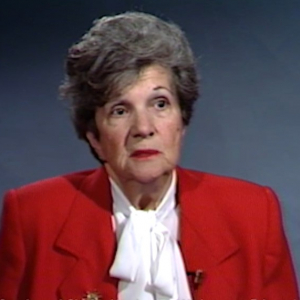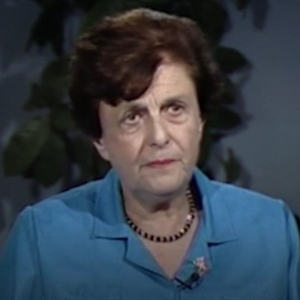David Zuckerbrot
David Zuckerbrot recalls conditions in the Nazi concentration camps.
David Zuckerbrot was born in 1917, in Mielec, in the Galicia region of Poland. His father was a businessman, and his mother operated a restaurant. David was the youngest of five children, and had three sisters and one brother. The family spoke Polish at home, and two of David’s sisters attended university in Krakow and his third sister went to university in Prague.
During the Second World War, David survived for a while, living in Łódź . When rumours circulated that a ghetto was about to be established, David left for Krakow. There, he was reunited with his parents. Eventually, he was deported to work as a slave labourer for an airplane manufacturer in Germany. David’s parents were deported to the Treblinka death camp where they were killed. David continued to work in the airplane factory until 1944. The labour camp transitioned into a concentration camp, and David was deported to the Dachau concentration camp in southern Germany. From there, he was transferred to Leonberg, a subcamp of the Natzweiler concentration camp near Stuttgart.
David was liberated by the American Forces and worked with the Allies in their relief efforts. He was made an Honorary 2nd Class officer and worked as a supply chief in lower Bavaria until 1949. In the aftermath of the Holocaust, David discovered that most of his family was killed in Treblinka. Only one sister survived, having joined a partisans brigade in Slovakia.
In 1949, David immigrated to Washington DC. He married in 1951, and moved to New York. In 1955, David and his family immigrated to Canada. David and wife raised their family of two sons and one daughter, in Toronto.
David Zuckerbrot died in 2005 and his full testimony is part of the Canadian Collection of Holocaust survivor testimonies. It is preserved in the USC Shoah Foundation’s Visual History Archive and accessible through the Ekstein Library.
David ZuckerbrotThey changed the Arbeitslager – the working camp, to a concentration camp, and we became prisoners.
Testimony to discover
-
Physical Resistance

Tania Siegel
Tania Siegel discusses the challenges and struggles of life with the partisans.
Listen -
Liberation

Elly Gotz
Elly Gotz recalls being liberated by the American army at the Dachau Concentration Camp.
Listen -
Post-War Conditions

Vera Schiff
Vera Schiff discusses life in Prague in the immediate aftermath of the Holocaust and the realization that she was the sole survivor of her family.
Listen -
Hiding

Robert Rusinek
Robert Rusinek describes being hidden in Catholic orphanages during the Holocaust and its effect on his identity.
Listen
Educators & Students
Educational guides
Check resources